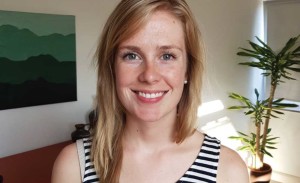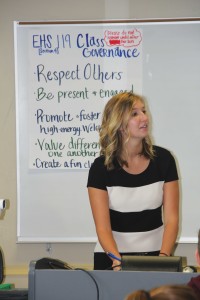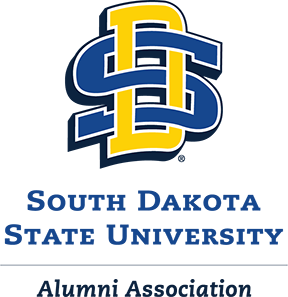Leadership development program for sophomores
Ryan Donnelly ’16, Kylie (Walterman) Braegelman ’16/M.S. ’17 and Nicole Peschong ’15/M.Ed. ’17 were not sure what to expect when asked to join LeadState. However, they are glad they did and admit they use part of what they learned from the experience every day.

Kylie (Walterman) Braegelman ’16/M.S. ’17 credits her experience with LeadState in helping her find her current job.
LeadState is an intentional leadership development program for sophomores. Originally created from a president’s leadership program proposal, Julie Bell, Deb DeBates and Tim Nichols started the program and focused it on strengths-based leadership and the Social Change Model for Leadership Development.
Students, who are nominated by the LeadState facilitation team and first-year academic advisors, are active members of LeadState for one semester of their sophomore year. After their semester of leadership development, a few return to be student coaches who assist with the facilitation of the program during their junior year. Typically, LeadState has approximately 60 students participate in LeadState with 10 additional students serving as student coaches, who act as peer mentors and coaches alongside a full-time faculty or staff member.
“We see LeadState as a catalyst, which is why we focus on sophomores. As a campus, we benefit from them going out and using the information they’ve learned, the experiences they’ve gained and the networks created,†said Shelly Bayer, the chair of the LeadState facilitation team and assistant director of the Center for the Enhancement of Teaching and Learning. “After they’ve been provided some development in leadership and some foundational knowledge in a curriculum as well as experiences, we see their confidence grow and we benefit as a university because they go and become leaders all over campus.â€
Bayer said several LeadState graduates have become Students’ Association presidents or leaders of other campus clubs and organizations.
Regardless of their roles, graduates take their newfound skills with them.
“In a direct way, I still work with StrengthsFinder (an assessment that sorts one’s strengths into one of four themes) regularly. If I feel like I’m losing sight of my goals, or just not feeling fulfilled, it is helpful for me to go back and read through my profile,†said Braegelman, who now works as a corporate finance consultant for an international acquisitions group in Germany. “I have also shared the material with friends and coworkers who are struggling to find their niche. The StrengthsFinder material can really facilitate a productive refocusing of energy. In a more indirect way, I apply my LeadState skills every day as I have incorporated many of them into my habitual behavior and mental outlook.
“I had known about LeadState for a while and had seen the group on campus before, and they always seemed so joyful and engaged,†Braegelman continued. “That kind of mindful, present and happy attitude is contagious. I had also been involved in a few leadership development groups during high school, so I knew that I found these programs very fulfilling.â€
Donnelly claims his LeadState experience helped him get an internship with Sen. John Thune’s office, a position that led to him landing a full-time position as a legislative correspondent.
“LeadState helped me identify and focus on my leadership strengths. The program also opened my eyes to the importance of getting involved on campus,†he said. “After participating in LeadState, I joined student organizations and went on to hold leadership positions in the Economics Club and the Mortar Board Honor Society.
“The highlight of my LeadState experience was a community service project where we spent an evening with junior high students at the Boys and Girls Club in Brookings,†Donnelly continued. “We talked to the students about the importance of doing well in school and pursuing a postsecondary education. We also planned activities and played games with the students. It was a fun and meaningful experience for both our LeadState team and the kids at the Boys and Girls Club.â€
Peschong now works at SDState as an academic advisor in the College of Education and Human Sciences and teaches EHS 119: First Year Seminar and EHS 319: Life, Love and Money. She was introduced to LeadState when in the Leadership 210 class.
“I was hesitant at first as I didn’t know what it consisted of but ultimately decided it was a unique way to get connected to campus,†Peschong said. “For me, learning about my strengths and how I can use them in my professional and personal life was an awesome part of the LeadState process. We talked a lot about strengths-based leadership and I feel I’m continuously working to grow in that area.

Nicole Peschong ’15/M.Ed. ’17 uses her LeadState experience to help SDState students consider joining the program.
“Aside from that, I’ve been fortunate to have had the opportunity to meet some incredible Jackrabbits through LeadState, both as a student and now a staff member on the LeadState committee,†she continued. “It was definitely the right choice for me.â€
“The best part about LeadState was the sense of community. I enjoyed developing my skills alongside my peers,†she said. “It was helpful to work through the development exercises with people who were also going through the same life transitions, like finding the right major, looking for a ‘place’ on campus, and discovering their own values and beliefs. College is a very unique and fruitful time to work on leadership skills.â€
Peschong, who uses her strengths both in the classroom and when meeting with students as an academic advisor, now gets to ask students if they are interested in joining the program and further developing leadership skills.
“There are certain students you can tell have that factor,†she said. “They’ve had excellent leadership experiences in the past and this would be a great opportunity for them to grow that a little further.
“However, other students might not have had those opportunities but you can see their potential. When I see one of those students, I definitely talk about my experiences—that’s where my selling points begin,†Peschong continued. “I talk about the people I got to meet and the leadership opportunities that were opened for me because of my experience with LeadState. It’s been six years since I was a LeadState member and I still find myself growing and developing my strengths further. I think it’s a really unique way for students to connect to campus and grow in their college careers. It’s a really great opportunity for them to consider.â€
Matt Schmidt







